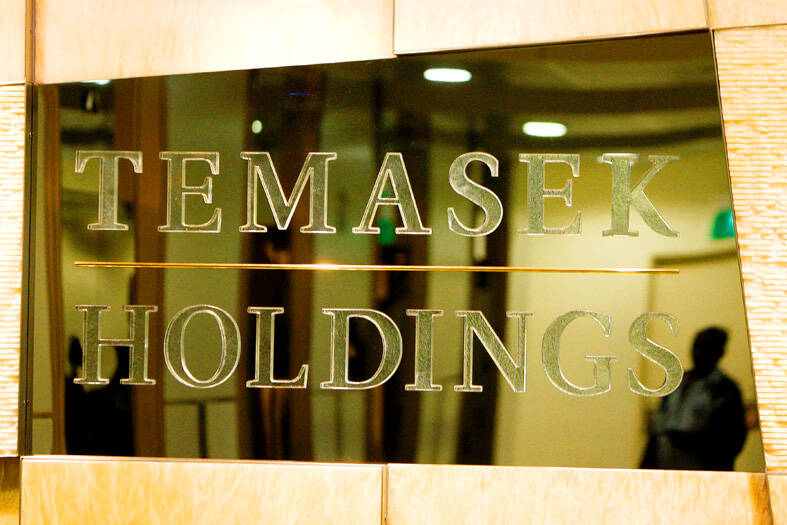Singapore’s state-owned Temasek Holdings Pte plans to invest US$30 billion in the US market over the next five years as the firm remains cautious about putting money into China.
“The Americas is going to be and continue to be the largest recipient of capital,” Temasek’s head of North America Jane Atherton said in an interview on Monday.
Temasek’s investments this year in North and South America surpassed China for the first time in at least a decade.

Photo: Reuters
Investment in the Americas now accounts for 22 percent, or US$63 billion, of its portfolio.
China investments make up 19 percent of the portfolio, and those in Singapore account for 27 percent.
The firm oversaw S$389 billion (US$289 billion) of assets as of March, up from S$382 billion a year earlier.
China and the US are vying to dominate semiconductor manufacturing because of its links to artificial intelligence (AI) and other aspects of the digital economy.
The US is trying to limit the rise of its Asian rival by deploying export controls and tariffs, and even considering a rule that would curb China’s access to advanced semiconductor technology.
That US-China strife has left investors navigating a geopolitical tripwire as they seek to capture a piece of one of the hottest sectors in the market.
Atherton said there are ways to structure investments around certain constraints, such as taking passive public equity stakes in listed semiconductor companies.
In China, Temasek has avoided investing in geopolitically sensitive areas, instead focusing on large domestic companies. It is looking to make new investments in electric vehicle makers and biotech firms.
“We make sure we are not investing in businesses that are in the crosshairs of geopolitical tensions,” Atherton said.
For the US, she said Temasek is looking to invest in AI-related firms, as well as semiconductor and infrastructure plays such as data centers and the companies that power them. It can gain exposure to data centers through its own real-estate subsidiaries — Mapletree Investments Pte and CapitaLand Group Pte — or by investing alongside private equity firms, Atherton said.
Temasek has grown its US assets fivefold in the past decade.

Real estate agent and property developer JSL Construction & Development Co (愛山林) led the average compensation rankings among companies listed on the Taiwan Stock Exchange (TWSE) last year, while contract chipmaker Taiwan Semiconductor Manufacturing Co (TSMC, 台積電) finished 14th. JSL Construction paid its employees total average compensation of NT$4.78 million (US$159,701), down 13.5 percent from a year earlier, but still ahead of the most profitable listed tech giants, including TSMC, TWSE data showed. Last year, the average compensation (which includes salary, overtime, bonuses and allowances) paid by TSMC rose 21.6 percent to reach about NT$3.33 million, lifting its ranking by 10 notches

Popular vape brands such as Geek Bar might get more expensive in the US — if you can find them at all. Shipments of vapes from China to the US ground to a near halt last month from a year ago, official data showed, hit by US President Donald Trump’s tariffs and a crackdown on unauthorized e-cigarettes in the world’s biggest market for smoking alternatives. That includes Geek Bar, a brand of flavored vapes that is not authorized to sell in the US, but which had been widely available due to porous import controls. One retailer, who asked not to be named, because

SEASONAL WEAKNESS: The combined revenue of the top 10 foundries fell 5.4%, but rush orders and China’s subsidies partially offset slowing demand Taiwan Semiconductor Manufacturing Co (TSMC, 台積電) further solidified its dominance in the global wafer foundry business in the first quarter of this year, remaining far ahead of its closest rival, Samsung Electronics Co, TrendForce Corp (集邦科技) said yesterday. TSMC posted US$25.52 billion in sales in the January-to-March period, down 5 percent from the previous quarter, but its market share rose from 67.1 percent the previous quarter to 67.6 percent, TrendForce said in a report. While smartphone-related wafer shipments declined in the first quarter due to seasonal factors, solid demand for artificial intelligence (AI) and high-performance computing (HPC) devices and urgent TV-related orders

MINERAL DIPLOMACY: The Chinese commerce ministry said it approved applications for the export of rare earths in a move that could help ease US-China trade tensions Chinese Vice Premier He Lifeng (何立峰) is today to meet a US delegation for talks in the UK, Beijing announced on Saturday amid a fragile truce in the trade dispute between the two powers. He is to visit the UK from yesterday to Friday at the invitation of the British government, the Chinese Ministry of Foreign Affairs said in a statement. He and US representatives are to cochair the first meeting of the US-China economic and trade consultation mechanism, it said. US President Donald Trump on Friday announced that a new round of trade talks with China would start in London beginning today,